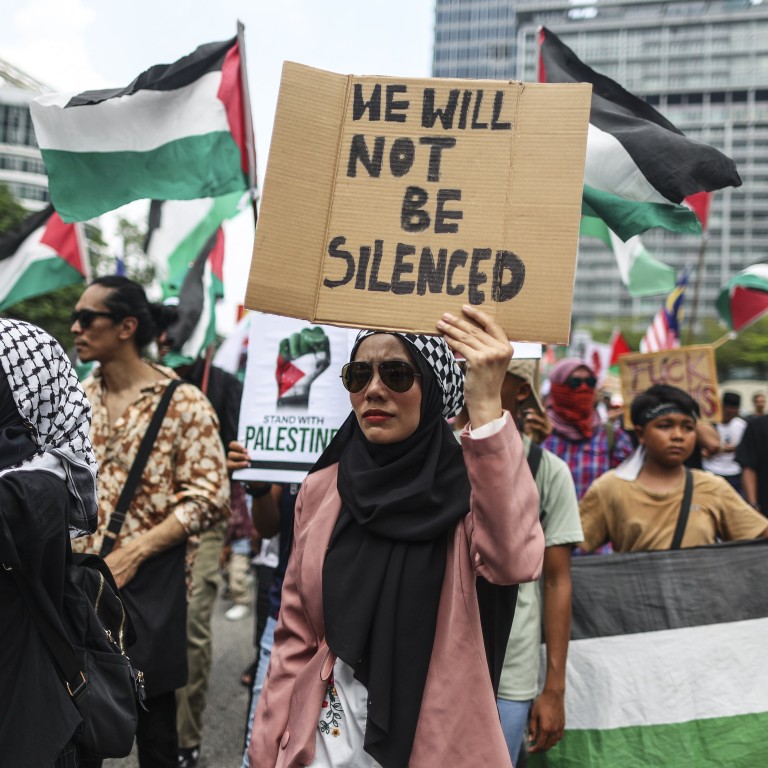
For Southeast Asians, Israel-Gaza war is more worrying than even South China Sea row – as extremism fears grow
- The Gaza war resonated deeply among Southeast Asian respondents in a recent survey, given the significant proportion of Muslims in the region
- The State of Southeast 2024 Survey also highlighted concerns about the global rules-based order and a potential rise in extremist activities
The Israel-Gaza war has not only significantly influenced the domestic politics of Muslim-majority countries in Southeast Asia, but also sparked divisive views in the region. In the initial stages of the conflict following the Hamas attack on October 7, Southeast Asian countries displayed a range of official positions.
Malaysia’s arrest of Israeli with 6 guns triggers mystery – was Mossad involved?
As the conflict surpasses the six-month mark – marked by escalating casualties, including aid workers, and a worsening humanitarian situation – multiple perspectives have emerged. The survey was conducted in January and February; even then, a large segment of regional respondents (41.8 per cent) voiced concerns that Israel’s attack on Gaza had gone too far.
By comparison, 17.7 per cent of respondents from the Philippines – the highest among all countries surveyed – maintained that Israel has the right to retaliate within the bounds of international law and felt that Hamas’ attack on Israel cannot be justified, a position endorsed by the Philippine government. Apart from identifying Israel as the “promised land” due to being majority Catholic/Christian, Filipinos’ economic considerations are also driving their support for Israel, with the country employing more than 30,000 Filipino workers, mostly as carers.
As the Israel-Gaza war worsens and remains high on Southeast Asia’s agenda, its governments are grappling with the potential impact of views that are seemingly growing divergent. The repercussions of this crisis will be significant, especially if it escalates into a wider conflict involving more Middle Eastern countries. The largest group of respondents (29.7 per cent) in the survey expressed concern over the potential rise of extremist activities, which could significantly affect domestic and regional security.
Indonesia’s divided Muslims unite around a common cause: the Israel-Gaza war
The importance of upholding international law, particularly international humanitarian law – a key principle of Asean – resonated deeply with Southeast Asians. Most respondents believed that the international community should prioritise supporting a ceasefire and provision of humanitarian aid (41.3 per cent). A significant proportion of respondents from Brunei, Indonesia, and Malaysia supported Palestinian self-determination as the second most favoured option (17.5 per cent). The largest proportion of respondents in favour of a two-state solution as the only outcome for Israel and Palestine was from Singapore (24.9 per cent). This was the region’s third most prevalent option (16.2 per cent) and also Asean’s common position in the joint foreign ministers’ statement released in October last year.
Singapore’s principled stand in international affairs is evident in its consistent advocacy for a humanitarian truce in Gaza and its balanced engagement with both Israeli and Palestinian leaders, and other key stakeholders in the Middle East. Foreign Minister Balakrishnan has emphasised that a negotiated two-state solution remains the sole viable path towards achieving a comprehensive, just, and durable peace in the Middle East. A clear majority of Singaporean respondents (57.2 per cent) supported their government’s position.
Singapore’s Israeli post takedown order reflects ‘heightened sensitivity’
Questions on the Israel-Gaza war in the survey have brought to light the diverse perspectives of the region, highlighting its potential vulnerability to religious polarisation. Despite similarly controversial violations of international law by Russia when it attacked Ukraine in 2022, and the looming threat of nuclear war on the European continent, Southeast Asia is more fixated on current events in the Middle East. Bridging the divides among religious communities in the region concerning the Israel-Gaza conflict presents a formidable challenge. Asean governments must navigate this terrain carefully to foster domestic cohesion and regional unity.
Asean should maintain its focus on rules-based approaches and encourage diplomacy and cooperation to counter any potential rise in violent extremism as the war drags on.

